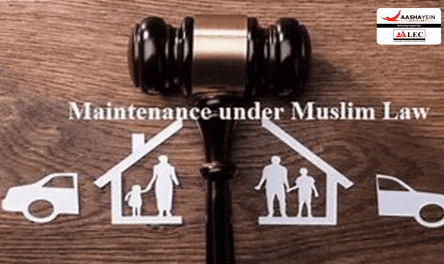The landmark case of Daniel Latifi v. Union of India (2001) dealt with important issues related to the Muslim Women (Protection of Rights on Divorce) Act, 1986. It focused on interpreting Section 125 of the CrPC, which ensures maintenance for a dependent wife. The case resolved the conflict between personal religious laws and constitutionally guaranteed fundamental rights. The Supreme Court upheld the validity of the Act while ensuring that divorced Muslim women receive a fair and reasonable settlement. It managed to strike a balance between gender justice, religious beliefs, and constitutional values.
FACT
In this case, the constitutional validity of the Muslim Women (Protection of Rights on Divorce) Act, 1986 was challenged before the Supreme Court. The Act was passed to appease a particular section of the society and to make the decision in the case of Mohd. Ahmed Khan v. Shah Bano Begum is ineffective.
Shah Bano Case
A landmark case highlighting the rights of Muslim women in India was the Shah Bano case. In this case, the husband appealed a ruling by the Madhya Pradesh High Court, which ordered him to pay his divorced wife Rs. 179 per month as maintenance, instead of the much lower Rs. 25 previously set by the magistrate. The couple had been married for 43 years before the elderly and sick wife was forced out of her husband's home. The husband had provided her with Rs. 200 per month for maintenance for about two years, but when these payments stopped, she filed a petition under Section 125 of the Code of Criminal Procedure (Cr.P.C.).
Although she was a Muslim woman, the Supreme Court ruled in favor of her right to alimony. However, this decision faced strong opposition, leading Parliament to pass the Muslim Women (Protection of Rights on Divorce) Act, 1986. This law effectively overturned the Supreme Court’s ruling, limiting maintenance to only the "Iddat" period, a brief waiting period after a divorce under Islamic law. As a result, Shah Bano and other divorced Muslim women were denied long-term financial support from their former husbands.
Shah Bano's lawyer, Danial Latifi, argued that the Act was unconstitutional because it violated fundamental rights guaranteed by the Constitution. He claimed that by denying divorced Muslim women the financial support they had previously relied on, the Act violated Article 21, which ensures the right to life. Additionally, the Act was said to breach Articles 14 and 15, which ensure equality and prohibit discrimination, as it denied Muslim women the same maintenance rights available to others under Section 125 of the Cr.P.C. To challenge this, Latifi filed a Writ Petition in the Supreme Court, questioning the constitutional validity of the Muslim Women (Protection of Rights on Divorce) Act, 1986.
Issues
The key issues in the case of Danial Latifi v. Union of India were as follows:
- Whether Section 3(1) of the Muslim Women (Protection of Rights on Divorce) Act, 1986, violated the fundamental rights guaranteed under Articles 14 (equality before the law), 15 (prohibition of discrimination), and 21 (right to life) of the Indian Constitution.
- Whether the Muslim Women (Protection of Rights on Divorce) Act, 1986, was constitutionally valid as a whole.
- Whether divorced Muslim women had the right to claim maintenance under Section 125 of the Criminal Procedure Code, 1973, even after the iddat period ended.
You can also read the Blog by visiting [Blog]
For more information, visit [Aashayein Enquiry Section]
Arguments-
Petitioner’s Arguments:
- Section 125 CrPC aims to prevent destitution and vagrancy among divorced women, supporting the right to life under Article 21.
- Denying Muslim women this remedy violates their fundamental rights to equality (Article 14) and life with dignity (Article 21).
- The 1986 Act is unconstitutional, un-Islamic, and undermines the secular character of the Constitution by depriving Muslim women of protections available under Section 125 CrPC.
Respondent’s Arguments:
- The legislature has the authority to exclude Muslim women from Section 125 CrPC and provide alternate provisions through the 1986 Act.
- Parliament can prioritize personal law over Section 125 CrPC for Muslim women.
- Section 125 CrPC was not intended to override personal laws, making the 1986 Act valid and consistent with legislative intent.
Judgement of the Court
The Supreme Court upheld the Muslim Women (Protection of Rights on Divorce) Act, 1986, and provided key clarifications regarding its provisions. It stated that a Muslim husband is obligated to provide maintenance and reasonable provisions for his divorced wife’s future. Section 3(1)(a) of the Act allows this obligation to extend beyond the iddat period, even though it must be addressed within that period. The Court clarified that the husband's responsibility to maintain his wife continues even after the iddat period.
Moreover, if a divorced Muslim woman who has not remarried is unable to support herself after the iddat period, she can seek maintenance from her relatives under Section 4 of the Act. These relatives, including her children and parents, are obligated to maintain her according to the property they inherit from her under Muslim law. If the relatives are unable to provide maintenance, the Magistrate can direct the State Wakf Board to provide support. The Court further confirmed that the provisions of the Act do not infringe upon the fundamental rights guaranteed under Articles 14, 15, or 21 of the Indian Constitution.
Analysis
The Danial Latifi case was a landmark decision that clarified the maintenance rights of divorced Muslim women under Muslim personal law. The Supreme Court upheld the constitutional validity of the Muslim Women (Protection of Rights on Divorce) Act, 1986, while ensuring that Muslim women receive maintenance benefits comparable to those available to women of other religions under Section 125 of the Criminal Procedure Code, 1973. This judgment successfully balanced the principles of personal law with constitutional rights, reinforcing the ideals of equality and the right to life guaranteed by the Indian Constitution

